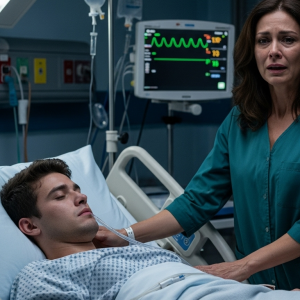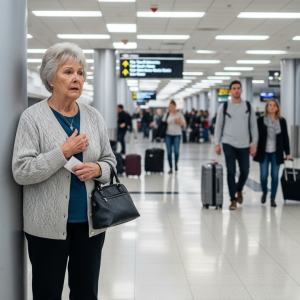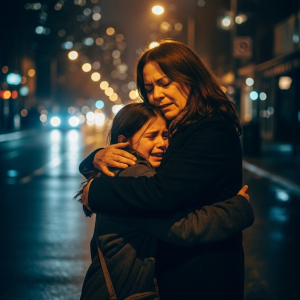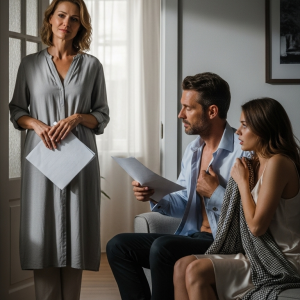I spent three days preparing for what I believed would be our first true Christmas dinner in years. The reservation at Le Bernardin was an extravagance, an $800 deposit for a table I prayed would be filled with laughter. At sixty-eight, I had learned a dangerous lesson: that time with family was worth any price. Or so I had convinced myself.
The bitter irony was a taste I knew well. I was trying desperately to unite people who, for the rest of the year, barely tolerated my existence. But my Harold had been gone for six months, and the holidays felt like a crushing weight without him. I needed my family. I needed to feel that I still mattered.
That morning, I chose my outfit with a ritualistic care. The navy dress Harold always said made my eyes look like the evening sky; the pearl necklace he’d given me for our fortieth anniversary. My hands trembled as I fastened the clasp, a tremor I disguised as excitement but knew was pure, unadulterated anxiety.
The calls began around three o’clock, just as the winter light started to fade. “Mom, I am so, so sorry,” Sarah’s voice oozed through the phone, a confection of synthetic sweetness. “Emma’s come down with something dreadful, and we can’t risk exposing everyone. You understand, don’t you?”
My daughter had mastered that tone—the one that dripped with concern but felt like a dismissal. Emma was my granddaughter, a girl I hadn’t seen in months. “Of course, dear,” I heard myself say, the words tasting like ash. “Is there anything I can do?”
“No, no, we’re fine. Rain check!” A rain check, as if our fractured family was a tennis match to be postponed for convenience. Twenty minutes later, my son Michael called. “Mom, listen. I’m pinned down at the office. This deal is imploding, and I have to be the one to fix it. You know how it is.”
Oh, I knew. Michael’s deals had always been a more devoted child to him than I was a mother. “What about Jennifer and the boys?” I asked, a sliver of hope remaining.
“They’re actually over helping Sarah with Emma,” he said, a little too quickly. “Just keeping the kids occupied while she’s sick.” A cold dread settled in my stomach. They were all together. There was a pause. “Well, yeah, but it’s nothing planned. Just for a bit.”
Nothing planned. The final blow came from my youngest, David. His excuse was the most creative. His car had supposedly broken down, stranding him for hours. “So sorry, Mom. Maybe next time.”
I sat in my silent living room, a statue in a navy dress, staring at the phone. Three children, three excuses, all delivered with the cruel precision of a firing squad. But the shame of sitting alone in my apartment felt infinitely worse than the pity I’d face sitting alone in public. So, I went.
Le Bernardin was a galaxy of warmth and celebration. Families, whole and happy, buzzed at every table. The hostess regarded me with a gentle pity as I confirmed, “Yes, it will just be me. At the table for six.”
“Would you prefer a smaller table, madam?” she asked softly.
“No,” I said, my voice a blade. “Leave it as it is.” I ordered a bottle of the Bordeaux Harold loved, the deep red a stark contrast to the white expanse of the empty table. I ordered appetizers I couldn’t afford and entrées I wouldn’t eat, trying to fill the void with plates since I couldn’t fill it with people.
The breaking point arrived with the dessert cart. At a nearby table, three generations were laughing, the grandmother seated at the head, a treasured queen. That’s when the tears came—silent assassins at first, then an unstoppable flood. I was dabbing my eyes with a linen napkin when I heard him.
Running footsteps. A blur of motion. Hugo.
He burst through the restaurant doors, his seventeen-year-old face flushed from the biting wind and something fiercer—rage. “Grandma Delia!” His voice cut through the civilized hum of the dining room. He weaved through the tables, ignoring a waiter’s protest, his coat half-buttoned as if he’d fled a burning building.
“Hugo,” I stood, bewildered. “What are you doing here? Aren’t you with your mother?”
He was panting, his chest heaving. In his hand, he clutched a thick manila envelope. His eyes were bright with unshed tears. “I had to find you,” he gasped, his voice cracking. “I couldn’t let them do this to you. Not anymore.”
“Do what, sweetheart? What are you talking about?”
He glanced around, then locked his gaze on me. “They’re all together, Grandma. At Romano’s, three blocks away. They’ve been planning this for weeks.” My knees gave way, and I sank back into my chair. “Planning what?”
Hugo’s jaw clenched, a gesture so painfully reminiscent of Harold. “The dinner wasn’t the real plan. They needed you out of the way tonight.” He held up the envelope. “Because of this.”
I stared at the object as if it were a snake. “What is it?”
“It’s from Grandpa Harold’s lawyer. It came to Mom’s house today.” His voice dropped to a conspiratorial whisper. “It’s his will, Grandma. And there’s something else.”
He collapsed into the chair beside me, the one meant for his mother. “They made me go with them. Said it was a ‘family meeting’ about your future. But when the lawyer started reading…” Hugo’s hands trembled as he pushed the envelope across the table.
“Everything’s yours, Grandma. The house upstate, the investments… everything. Grandpa left it all to you.” The world outside our table seemed to melt away. “That’s… wonderful, dear. But why would that upset them? I’m his widow.”
“Because they’ve been telling everyone—including me—that Grandpa was leaving most of it to them. Mom’s been picking out new kitchen cabinets for the upstate house for a month. Uncle Michael had already earmarked the investments for his business.”
My mouth was desert-dry. “How long have they known about the will?”
“Months,” Hugo said quietly. “But there’s more. There’s something in here they really don’t want you to see.” He reached into the envelope, pulling out a sheaf of papers. They were crisp, official, terrifying.
“It’s a DNA test, Grandma. Grandpa had it done right before he died.”
I took the papers, the scientific jargon a blur. But the results were brutally clear. The test compared Hugo’s DNA to my family’s. “I don’t understand,” I whispered.
Hugo’s voice was barely audible. “I’m not your grandson, Grandma Delia. Not really. Mom adopted me when I was two, but she lied to you. She told you I was blood. She’s been using me all these years to get money from you and Grandpa.”
The papers slipped from my numb fingers. The wine glass tipped, its contents spreading across the white linen like a fresh wound. Everything I thought I knew—my family, my life, my own love—was a carefully constructed lie, and the walls were finally crashing down
In the sterile quiet of the restaurant’s restroom, I splashed cold water on my face. The woman in the mirror was a stranger—her makeup a ruin of tear tracks, her eyes hollowed out by betrayal. Yet, beneath the shock, something new flickered. An awakening.
Back at the table, I made Hugo eat while he unspooled the whole, sordid story. The lawyer’s office, he said, was a stage set for my children’s greed. “Mr. Peterson’s office was all dark wood and leather,” he began, picking at a bread roll. “Mom and the uncles sat there like they were accepting an award.”
I poured more wine, my hand steady now. “How long did they know about the reading?”
“Mom got the call three weeks ago. She made a whole performance out of it, how sad it was to deal with Grandpa’s affairs. But her eyes were gleaming. She kept talking about making the lake house into something ‘really special.’”
The lake house. Our sanctuary. The thought of Sarah’s sterile taste infecting its warm, wooden soul made my stomach churn. “And what happened when the reading began?”
“At first, it was normal. Small bequests, personal items. But then Mr. Peterson got to the assets. The house, the investments, the savings. And one by one, he read your name. ‘To my beloved wife, Delia Holloway.’ Over and over.”
I could see their faces, the confident smiles curdling into disbelief. “Mom went white as a sheet,” Hugo continued. “Uncle Michael started arguing, shouting that there had to be a mistake, that Grandpa had made promises. Uncle David just sat there, his mouth hanging open like a fish.”
“What did the lawyer say?”
“He was unshakable. He said the will was ironclad, updated six months before Grandpa died. Everything to you, with one clause: if something were to happen to you, the estate would bypass them entirely and go directly to the grandchildren.”
That was Harold. Protective, prescient, always three steps ahead. Even in death, he was shielding me. “But then,” Hugo’s voice dropped, “Mr. Peterson pulled out another envelope. He said Grandpa left instructions for it to be opened only if there was a dispute.”
My heart hammered against my ribs. “The DNA test.”
“Right. Mr. Peterson said Grandpa had grown concerned. He’d overheard things… people making plans for his money before he was even gone. He wanted to be certain who was really family.” I remembered Harold’s quiet observations in his final months, a watchfulness I’d mistaken for weariness.
“The lawyer opened it right there?”
Hugo nodded. “The results were… definitive. I’m not biologically related to anyone in the family. And there was more. A letter from a private investigator Grandpa had hired.”
“A private investigator?”
“Yeah. The story Mom told you—that I was the son of a distant cousin who died tragically—it was all a lie. She adopted me through an informal arrangement with a teenager who couldn’t cope. There are no blood ties. At all.”
I felt the air leave my lungs. “But… why? Why lie about that?”
Hugo’s laugh was a bitter, broken sound. “Money, Grandma. It was always money. Mom knew you and Grandpa were soft touches for a sad story, especially one with a child. So she invented the perfect one: the orphaned great-nephew.”
The checks I’d written. School clothes, summer camps, tutoring—all to give my ‘grandson’ a better life. “How much?” I whispered.
“The P.I.’s report had an estimate. Just for my expenses, they calculated nearly $200,000 over fifteen years. But that’s not counting the other things.”
“What other things?”
Hugo hesitated. “The times Mom said your memory was slipping and you needed help managing your finances. The ‘emergency’ loans for Uncle Michael’s business. Uncle David’s gambling debts, which were always framed as a ‘family crisis.’”
They hadn’t just lied; they had built an empire on my love. “Grandma,” Hugo’s voice was soft, pained. “Mom used to coach me before we’d visit. What to say, how to act grateful, how to subtly mention things I needed to make you feel generous. I thought it was normal.”
I looked at this boy, this stranger who felt more familiar to me than my own children. “What happened after the lawyer finished?”
“Chaos. Mom started screaming that Grandpa was senile. Uncle Michael was on the phone with his own lawyer before we even left the room. Uncle David just kept repeating, ‘This isn’t fair.’”
“And you?”
Hugo met my eyes. “I thought about every hug you ever gave me. Every birthday card. The way you always asked about my grades like you actually cared. And I realized… even if we’re not related by blood, you’ve been more of a real grandmother to me than any of them have been a real family.”
My throat closed. “Hugo…”
“They didn’t even see me leave. They were too busy plotting how to contest the will. Mom was already talking about having you declared incompetent. So I came here. I ran. I couldn’t let you be alone tonight.”
Across the table, in the wreckage of my old life, I saw the foundation of a new one. Maybe family wasn’t about blood. Maybe it was about who runs through the cold to find you when you’re all alone.
The next morning, I woke with a startling clarity. Hugo was asleep on the couch, wrapped in Harold’s old afghan, his face peaceful for the first time. The grief that had been my constant companion for months was gone, replaced by a cold, hard resolve.
I called Mr. Peterson’s office the moment it opened. “Mrs. Holloway,” his secretary said warmly. “Mr. Peterson was hoping you’d call. He has some additional documents your husband left, with very specific instructions.”
At the lawyer’s office, Mr. Peterson, a kind man with Harold’s weary wisdom in his eyes, greeted us. “Mrs. Holloway. And you must be Hugo. Your grandfather spoke of you a great deal.”
Hugo looked stunned. “He did?”
“Oh, yes. He was very worried about you.” Mr. Peterson retrieved another, thicker manila envelope. “Harold hoped these wouldn’t be necessary. But given your children’s reaction, I believe it’s time you saw them.”
Inside was an arsenal. Photographs. Bank statements. Transcripts of recorded conversations. “Harold hired an investigator eighteen months ago,” Mr. Peterson explained. “He had become suspicious.”
The first photo showed Sarah leaving a luxury spa, dated three days after she’d called me crying about not being able to afford Hugo’s school supplies. Another showed Michael entertaining clients with champagne, the bill a staggering $800, on the same day he’d borrowed $3,000 from me for a fabricated medical emergency.
But it was the audio recordings that stole my breath. “Harold started insisting on putting family calls on speakerphone,” Mr. Peterson said, handing me a small digital player. “He claimed his hearing was failing. In reality, he was recording.”
I put in the earbuds. Sarah’s voice, slick with false concern. “Mom’s getting more forgetful, Dad. We’re worried.”
Harold’s voice, tired but firm. “She seems fine to me.”
Michael’s voice, smooth as oil. “But she repeats herself. Forgets conversations. If something happens to you, Dad, we need to make sure she’s protected. Maybe we should get involved in her finances now.”
David, chiming in. “And honestly, Dad, the money you’re spending on Hugo… we love the kid, but he’s not even really family. That money could go toward Mom’s long-term care.”
My blood ran cold. Hugo sat beside me, carved from stone.
Harold’s voice, now dangerously quiet. “Hugo is family. And what we spend on him is none of your business.”
Sarah, again. “Dad, be realistic. Your mother doesn’t need assisted living now,” she cooed, “but if we get the legal framework in place, it will be so much easier when the time comes.”
The recording was a twenty-minute blueprint of their plan to strip me of my autonomy, painting me as a helpless woman for Harold’s benefit. When it ended, a profound silence filled the room.
Mr. Peterson handed me a financial analysis. The total they had taken from us over fifteen years: $847,000. The report detailed where it went: luxury vacations, designer clothes, expensive cars. They hadn’t been struggling; they had been funding a lavish lifestyle on my love.
“He also left this,” the lawyer said, producing one final document. It was titled: Protection Protocol for Delia Holloway. Harold had anticipated every possible move they could make and created a countermeasure for each.
The most important clause was near the end. “Any heir who challenges the will,” Mr. Peterson read, “or attempts to have you declared incompetent, automatically forfeits any and all claim to the estate.” If they fought, they would lose everything.
Finally, he handed me a sealed envelope. On it, in Harold’s familiar script: For my beloved Delia. When you’re ready to fight back.
Harold hadn’t just left me an inheritance. He had left me a roadmap to my own liberation, and the weapons I would need for the war to come. My children thought they were playing chess, but my husband had already checkmated them from beyond the grave.
The two-hour drive to the lake house was a silent pilgrimage. With every familiar turn, I felt Harold’s presence, not as an absence, but as a guiding hand on my shoulder. We used a new key Mr. Peterson had provided—the first of Harold’s many secrets.
Inside, the house smelled of lavender and wood polish, the scent of my life with him. It was in his study, surrounded by his books and unfinished crosswords, that I found it: another envelope with my name on it. This was it. His final word.
Hugo stood quietly in the doorway as I sat in Harold’s leather chair and read.
My dearest Delia, it began.
If you are reading this, it means our children have finally shown you who they truly are. I am sorry, my love. I am sorry I couldn’t protect you from this pain while I was alive. But everything I did in my final months was for you.
I know you think you failed as a mother. You didn’t fail, Delia. They did. You gave them your love, and they saw it as a weakness to be exploited. I watched them break your heart, again and again, and I stayed quiet because I couldn’t bear to make you choose. That was my failure, not yours.
But when they began plotting to take control of your mind and your money, I could not stay silent any longer. The woman I married was strong and fierce. That woman is still inside you, Delia. She is just waiting for permission to stand up. Consider this your permission.
I have left funds for Hugo’s education in the safe behind my diploma. The combination is your birthday. He has earned it, not by blood, but by character. There is something else in there, too. A deed to the lot next door. I bought it years ago, a surprise for our 50th anniversary. Build something beautiful there, Delia. Something that is entirely yours.
They will come back. They will apologize and they will lie. Do not believe them. You owe them nothing. The rest of your life is your own. Live it for yourself. Choose to be happy. Know, every single day, how much you were loved.
You are enough, Delia. You have always been enough.
All my love, always, Harold
Tears streamed down my face—not of grief, but of gratitude. He saw me. He had always seen me. I walked to the safe, spun the dial with my birthdate, and the heavy door swung open. Inside was the deed, the bank information, and one last thing: a small, velvet box containing a key to a safety deposit box I never knew existed.
“Come on,” I said to Hugo, my voice stronger than it had been in years. “Let’s go see what else your grandfather left for us.” But first, I had three phone calls to make. It was time my children learned that their mother was no longer a doormat. She was a fortress.
Six months later, I stood on the porch of the lake house, a cool breeze drifting over the water. Next door, the guest cottage was nearly complete, a beautiful structure Hugo had designed himself. It was his home base, a testament to the new life we were building from the rubble of the old one.
The phone calls had been brutally final. Sarah had wept. “You can’t just cut us off! We’re family!”
“Family doesn’t plot to have their mother declared mentally unfit,” I had replied, my voice calm and clear. “Hugo is seventeen. He has chosen to stay with the person who actually loves him.”
Michael had blustered, all righteous anger. “You’re letting that kid poison you against us!”
“No, Michael. You poisoned our relationship yourselves, one lie and one demand at a time. Goodbye.”
David, ever the weakest, had simply pleaded. “Mom, what are we supposed to do?”
“You will do what I should have made you do thirty years ago,” I said. “You will stand on your own two feet.”
They tried, of course. Unannounced visits, pathetic cards, even using my granddaughter Emma as a pawn. But Harold’s letter was my shield. I was no longer responsible for fixing what they had broken.
Our life was quiet, and it was good. Hugo had blossomed, accepted to a prestigious art school. He had become the son of my heart, if not my blood. Our evenings were filled not with tense silence, but with easy conversation and the company of new friends—Margaret from next door, Dr. Morrison from town. We were a patchwork family, stitched together by choice and affection.
One evening, my phone rang. It was Mr. Peterson’s daughter, who had taken over his practice. “Mrs. Holloway, I wanted to let you know we executed the final part of your husband’s instructions today.”
“What instructions?”
“A charitable fund. Since your children’s legal challenges were dismissed, we were able to distribute $200,000 to the children’s hospital, the women’s shelter, and the local library. The donations were made in your name.”
Even from the great beyond, Harold was rebuilding my reputation, my dignity, my very identity in the community.
Later that night, as we sat on the porch watching the stars appear over the lake, Hugo took my hand. “Grandma Delia,” he said softly. “I know the DNA test says we’re not related, but… you’re the only real family I’ve ever had.”
I squeezed his hand, my heart full. “Hugo,” I said, looking at the bright, kind face of the boy who saved me. “Blood doesn’t make a family. Love does. Choice does. Showing up does. And you, my dear boy, have always shown up.”
The lake was a perfect mirror of the night sky, calm and endless. For the first time in my life, I felt truly at peace, not as a mother or a widow, but as myself. I was Delia. And I was finally home.




